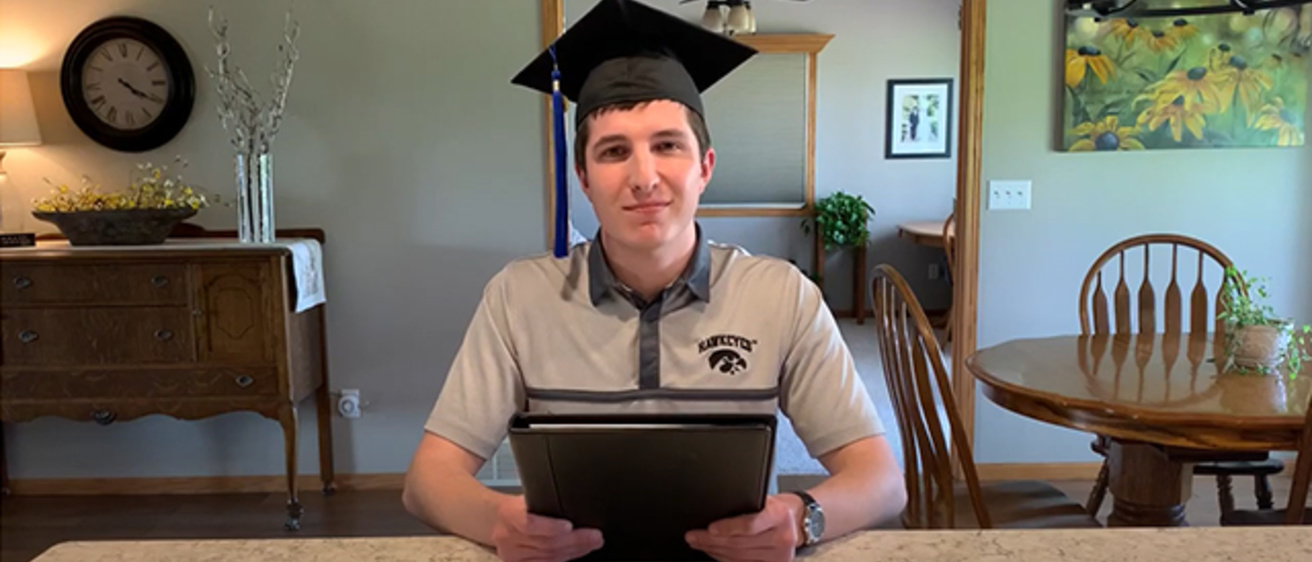Graduates, think back to your very first days in the Pappajohn business building. Remember how lost you’d get? Pappajohn is a box of tricks designed to confuse newcomers. The west and south wings look exactly the same, right down to the identical Henry Tippie painting, which feels like a practical joke. And then they added a second Pat’s diner, called Pat’s too, t-o-o, so when you texted your friend, “I’m at Pat’s”, and they sent back, “I’m at Pat’s too”, you said, “great! Wait…” and started this whole “who’s on first?” act.
Now, think back to your last year in Pappajohn. You could navigate those halls like you could sit through a 7:30 AM lecture, which is to say: with your eyes closed. You not only knew your way around; you knew where your friends would be at what time, where free food might appear, and which office doors you could knock on seeking guidance. You even finally learned your cardinal directions.
Recently, we lost our familiar Tippie routine. Classes went online; student orgs stopped. Everyone’s lives changed in a dramatic way. But at graduation, it’s important to remember the quieter change that happened to us. The change that happened sometime between when we came in, not knowing our way around—to now. Because we’ve already lived through change, we know we can face it the future.
One of my professors told us the story of the Ship of Theseus to explain how a company changes over time. That story also describes the gradual way we’ve changed at Tippie. In ancient times, the hero Theseus and a crew of sailors set off from Greece in a big, wooden ship. They spend so long at sea, the sailors need to keep replacing the boat’s rotting planks of wood with new, fresh beams. By the time the ship arrives at its destination, every single board has been replaced. So—is it the same ship as the one that originally set sail?
I know it’s just a thought experiment, but I’ve been wondering about Theseus’ voyage itself, about how long the sailors must’ve been out at sea for every piece of old wood to go rotten; how anxious they must’ve felt traveling so far from home. And I wonder if Theseus, near the end of the voyage, ever woke up during the night, feeling uneasy in yet another strange new latitude, and reassured himself by saying, “Well, at least this old ship never changes.”
Sometimes change happens so gradually, we fool ourselves into thinking it never happened at all. I always viewed college life as unchanging, constant. Maybe you’ve seen one of those black-and-white photos of the Pentacrest, where someone a long time ago was lounging on the grass the same way you always do. Like me, you’ve probably left campus on a break, and returned, surprised that something about it smells familiar—like hot coffee or musty books or sticky shoes or mowed lawns or corn statues. And what I loved more than the smell of campus was the expectation of that smell, the comfort of knowing that while I was here, Iowa would stay the same.
So, now we’re at graduation, and I confess that I’m reluctant to begin my post-grad journey, because I’ll miss the familiarity. I’m afraid to start over somewhere new. On a deeper level, I fear that I’m about to become a different person, that my life will become unrecognizable after college.
But then I think back to freshman us, and I realize who we are today would be unrecognizable to our younger selves. We’ve learned things about ourselves here; we’ve forgotten things about ourselves; we’ve found lifelong friends; we’ve lost loved ones; our relationships changed; our world changed; our worldviews changed. However static your life may have felt, it was the Ship of Theseus; it changed a little every day—you changed a little every day. And if you recognize that change, you are not powerless to it. When you imagine what our in-person commencement ceremony might’ve been like—your family, your friends, your classmates beside you—you’ll realize you are not alone in change.
When life changes abruptly, the way it has in the last few months, we take stock of what we once took for granted; we pay attention. But let’s also notice the gradual changes that formed us into who we are today. While at Iowa, I changed into someone who scared my roommates when I tried to cook, who called mom and dad at odd hours for advice or a good laugh, who screamed the “I” in I-O-W-A until my voice went hoarse.
When we recognize that our circumstances, our relationships, and our actions all have and will continue to shape us, present and future changes may begin to feel more manageable. Secure in knowing that change is inevitable, we can extend gratitude to the people who do change our lives and be hopeful about the person we will change into.
So, here’s the Class of 2020’s message of gratitude and hope, as the boards on our personal ships continue to be replaced. To all the people we couldn’t tell in person, the people we love at Iowa, at home, and anywhere else: Thank you. We are who we are today, and who we will be tomorrow, because of you.
And someday, fellow graduates, we might come back to Iowa City, and Pappajohn will be replaced or renovated beyond recognition. And rather than mourn that, maybe we can just take a deep breath, spot some hopelessly lost freshmen wandering the halls, and smile—knowing they’ll find their way soon enough.
